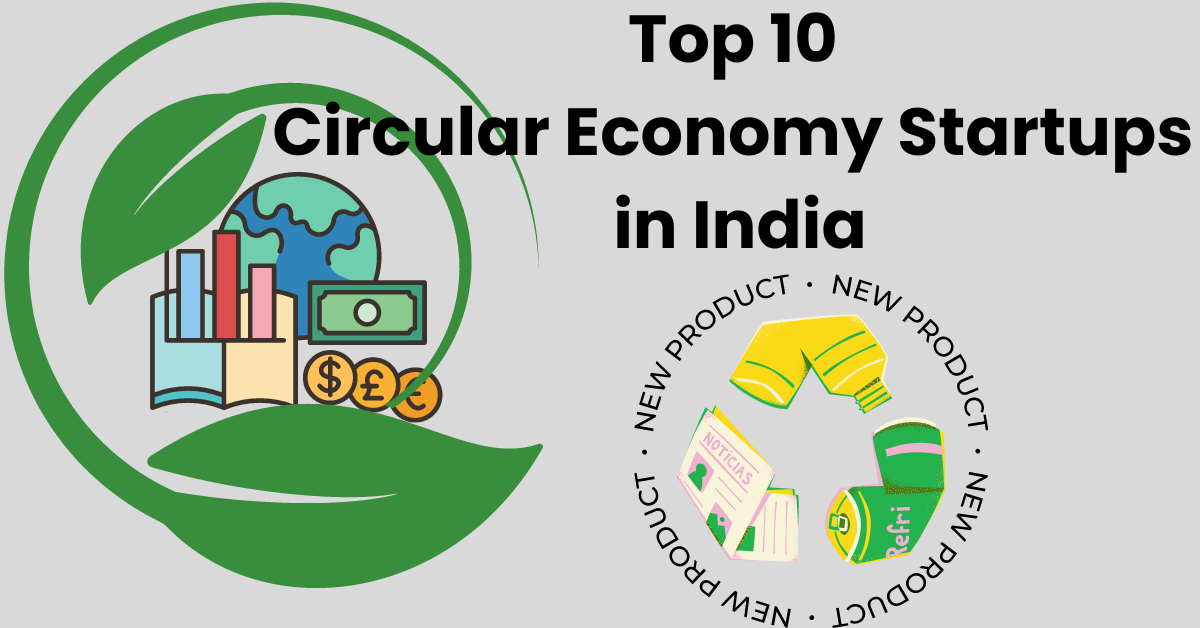Top 10 Circular Economy Startups in India
Discover Top 10 Circular Economy Startups in India leading the sustainability revolution. Learn about innovative companies like Karma Recycling, Goli Soda, and Swachh, pioneering eco-friendly solutions in electronics, fashion, sanitation, and more. The concept of a circular economy has gained significant traction globally as a sustainable alternative to the traditional linear economic model of ‘take, make, dispose’. In a circular economy, resources are kept in use for as long as possible, with maximum value extracted during their lifecycle, and products and materials are regenerated at the end of their service life. India, with its burgeoning startup ecosystem and increasing focus on sustainability, has seen the rise of several innovative startups contributing to this paradigm shift. Here are ten notable circular economy startups in India making a significant impact:
Table of Contents
1. Karma Recycling
Karma Recycling, founded in 2013 by Akshat Ghiya and Aamir Jariwala and based in Mumbai, Maharashtra, focuses on extending the lifecycle of electronic gadgets through recycling and refurbishment. They provide a platform for responsible disposal of electronic waste, encouraging consumers to recycle old devices. By refurbishing and reselling usable electronics, Karma Recycling not only reduces electronic waste but also promotes the reuse of valuable resources, contributing to a more sustainable environment.
| Name | Karma Recycling |
|---|---|
| Founders | Akshat Ghiya, Aamir Jariwala |
| Founded | 2013 |
| Location | Mumbai, Maharashtra |
| Overview | Karma Recycling focuses on extending the life of electronic gadgets through recycling and refurbishment. They facilitate responsible disposal of electronic waste while promoting the reuse of electronics, thus reducing environmental impact. |
Karma Recycling is a pioneering startup focused on extending the life of electronic gadgets through recycling and refurbishment. They enable consumers to responsibly dispose of their electronic waste while also refurbishing and reselling usable devices. This approach not only reduces electronic waste but also promotes the reuse of electronics, thereby conserving resources and reducing environmental impact.
Also read: Top 10 Gig Economy Startups in India
2. Namo E-waste Management Ltd.
Founded in 2010 by Bharat Jain and headquartered in Pune, Maharashtra, Namo E-waste Management Ltd. specializes in the comprehensive management of electronic waste. They offer solutions for the collection, segregation, and recycling of e-waste, ensuring that hazardous materials are handled safely and valuable metals are extracted for reuse. By promoting responsible e-waste disposal practices, Namo E-waste Management contributes significantly to minimizing the environmental impact associated with electronic waste in India.
| Name | Namo E-waste Management Ltd. |
|---|---|
| Founders | Bharat Jain |
| Founded | 2010 |
| Location | Pune, Maharashtra |
| Overview | Namo E-waste Management specializes in the collection, segregation, and recycling of electronic waste. They provide end-to-end solutions for e-waste management, ensuring safe handling of hazardous materials and extraction of valuable metals for reuse. |
Namo E-waste Management Ltd. specializes in the collection, segregation, and recycling of electronic waste. They provide end-to-end solutions for e-waste management, ensuring that hazardous materials are safely handled and valuable metals are extracted for reuse in manufacturing new electronics. Their operations contribute significantly to reducing the environmental footprint associated with electronic waste disposal in India.
Also read: Top 10 Data Privacy Startups in India
3. Revive
Revive, established in 2018 and based in Bengaluru, Karnataka, is dedicated to promoting sustainable fashion through clothing rental services. Founded by Akshay Varma and Arijit Sengupta, Revive offers a platform where customers can rent designer clothing, reducing the environmental footprint of fashion consumption. By encouraging the reuse of garments and discouraging fast fashion trends, Revive contributes to a circular economy model in the fashion industry, emphasizing sustainability and conscious consumerism.
| Name | Revive |
|---|---|
| Founders | Akshay Varma, Arijit Sengupta |
| Founded | 2018 |
| Location | Bangalore, Karnataka |
| Overview | Revive promotes sustainable fashion through clothing rental services. They offer a platform for renting designer clothes, aiming to reduce textile waste and encourage a circular approach to fashion consumption. |
Revive is a startup focused on sustainable fashion by offering clothing rental services. They aim to reduce the environmental impact of fast fashion by promoting the reuse of garments. Customers can rent designer clothes for a fraction of the retail price, promoting a circular approach to fashion consumption and minimizing textile waste.
Also read: Top 10 E-learning Startups in India
4. Goli Soda
Goli Soda, founded in 2013 by Jayanth Kumar and Karthik Vaidyanathan and located in Chennai, Tamil Nadu, specializes in upcycling waste materials into eco-friendly products. They transform discarded items such as glass bottles, tetra packs, and fabric scraps into stylish and functional products like bags and home décor. Goli Soda not only reduces waste but also supports local artisans and promotes sustainable living by showcasing the creative potential of upcycled materials.
| Name | Goli Soda |
|---|---|
| Founders | Jayanth Kumar, Karthik Vaidyanathan |
| Founded | 2013 |
| Location | Chennai, Tamil Nadu |
| Overview | Goli Soda upcycles waste materials into eco-friendly products like bags and home décor. They transform discarded items such as glass bottles and fabric scraps into fashionable and functional products, promoting sustainability and supporting local artisans. |
Goli Soda is a social enterprise that upcycles waste materials into eco-friendly products. They transform discarded materials such as glass bottles, tetra packs, and fabric scraps into fashionable and functional items like bags, home décor, and stationery. Goli Soda not only reduces waste but also supports local artisans and promotes sustainable livelihoods.
Also read: Top 10 Language Learning Startups in India
5. Kabadiwalla Connect
Founded in 2013 by Siddharth Hande and based in Chennai, Tamil Nadu, Kabadiwalla Connect utilizes technology to formalize the informal waste recycling sector. They connect waste pickers directly with households and businesses through a mobile platform, facilitating efficient waste collection and recycling. By integrating technology with social impact, Kabadiwalla Connect enhances the livelihoods of waste pickers while promoting sustainable waste management practices across urban areas in India.
| Name | Kabadiwalla Connect |
|---|---|
| Founders | Siddharth Hande |
| Founded | 2013 |
| Location | Chennai, Tamil Nadu |
| Overview | Kabadiwalla Connect utilizes mobile technology to formalize the informal waste recycling sector. They connect waste pickers directly with households and businesses, enhancing waste collection efficiency and promoting recycling practices. |
Kabadiwalla Connect is a tech-driven social enterprise that formalizes the informal waste recycling sector in India. They utilize mobile technology to connect waste pickers directly with households and businesses for efficient waste collection. By integrating technology and social impact, Kabadiwalla Connect enhances the livelihoods of waste pickers and promotes the recycling of materials.
Also read: Top 10 Coding Bootcamps in India
6. Swachh
Swachh, founded in 2015 and headquartered in New Delhi, specializes in sustainable menstrual hygiene solutions. Co-founded by Aditi Gupta and Tuhin Paul, Swachh manufactures eco-friendly sanitary pads made from bamboo fiber. Their products offer an alternative to conventional pads, reducing plastic waste and promoting menstrual health awareness among women. Swachh contributes to environmental sustainability by providing biodegradable menstrual hygiene products that are both eco-friendly and accessible.
| Name | Swachh |
|---|---|
| Founders | Aditi Gupta, Tuhin Paul |
| Founded | 2015 |
| Location | New Delhi |
| Overview | Swachh manufactures eco-friendly sanitary pads made from bamboo fiber. They provide an alternative to conventional pads, promoting menstrual hygiene while reducing plastic waste and environmental impact. |
Swachh is a startup focused on sustainable sanitation solutions. They manufacture eco-friendly and biodegradable sanitary pads made from bamboo fiber, offering an alternative to conventional pads that contribute to plastic waste. Swachh’s products are not only environmentally friendly but also promote menstrual hygiene and health awareness among women in rural and urban areas.
Also read: Top 10 Financial Inclusion Startups in India
7. Biomatiq
Biomatiq, established in 2016 and based in Bengaluru, Karnataka, focuses on transforming agricultural waste into biodegradable packaging materials. Founded by Anirudh Sharma, Biomatiq uses agricultural by-products like sugarcane bagasse to create sustainable packaging solutions. By replacing traditional plastic packaging with eco-friendly alternatives, Biomatiq aims to reduce plastic pollution and promote sustainable agricultural practices in India and beyond.
| Name | Biomatiq |
|---|---|
| Founders | Anirudh Sharma |
| Founded | 2016 |
| Location | Bangalore, Karnataka |
| Overview | Biomatiq converts agricultural waste into biodegradable packaging materials. They use by-products like sugarcane bagasse to create sustainable packaging solutions, aiming to reduce plastic pollution and promote eco-friendly alternatives. |
Biomatiq is dedicated to transforming agricultural waste into sustainable packaging solutions. They utilize agricultural by-products like sugarcane bagasse and corn starch to create biodegradable packaging materials. By replacing traditional plastic packaging with eco-friendly alternatives, Biomatiq contributes to reducing plastic pollution and promoting sustainable agriculture practices.
Also read: Top 10 Microfinance Startups in India
8. Banyan Nation
Founded in 2013 by Mani Vajipey and Raj Madangopal and headquartered in Hyderabad, Telangana, Banyan Nation is a recycling technology company specializing in plastic waste management. They develop innovative recycling solutions and work with corporations and municipalities to manage and recycle plastic waste effectively. Banyan Nation’s initiatives not only reduce plastic pollution but also contribute to creating a circular economy by reintegrating recycled plastics into the manufacturing supply chain.
| Name | Banyan Nation |
|---|---|
| Founders | Mani Vajipey, Raj Madangopal |
| Founded | 2013 |
| Location | Hyderabad, Telangana |
| Overview | Banyan Nation is a recycling technology company specializing in plastic waste management. They develop innovative solutions for recycling plastic waste, working with corporations and municipalities to reduce environmental impact and promote sustainable practices. |
Banyan Nation is a recycling technology company that specializes in plastic waste management. They have developed innovative technologies for segregating and recycling plastic waste effectively. Banyan Nation works closely with corporations and municipalities to implement sustainable waste management solutions, thereby reducing the environmental impact of plastic pollution.
Also read: Top 10 Social Impact Startups in India
9. Boondh
Boondh, established in 2015 and based in Mumbai, Maharashtra, focuses on sustainable water solutions through reusable menstrual cups. Founded by Pooja Das Sarkar, Boondh offers eco-friendly alternatives to disposable sanitary products, promoting menstrual hygiene while reducing waste. Their reusable menstrual cups are designed to be cost-effective and environmentally friendly, contributing to reducing the environmental impact of menstrual waste in India.
| Name | Boondh |
|---|---|
| Founders | Pooja Das Sarkar |
| Founded | 2015 |
| Location | Mumbai, Maharashtra |
| Overview | Boondh promotes sustainable water solutions through reusable menstrual cups. They offer eco-friendly alternatives to disposable sanitary products, aiming to reduce waste and promote menstrual hygiene awareness among women. |
Boondh focuses on sustainable water solutions by promoting the use of menstrual cups as an alternative to disposable sanitary products. Their products are reusable, eco-friendly, and cost-effective, offering women a sustainable menstrual hygiene option while reducing the environmental footprint associated with menstrual waste.
Also read: Top 10 Sustainable Startups in India
10. ReNew IT
Founded in 2009 by Raghav Belavadi and based in Bengaluru, Karnataka, ReNew IT refurbishes and resells used IT equipment. They provide cost-effective computing solutions to underserved communities and educational institutions, promoting reuse and recycling in the IT sector. ReNew IT’s initiatives bridge the digital divide while reducing electronic waste by extending the lifecycle of IT equipment and promoting sustainable practices in the electronics industry.
| Name | ReNew IT |
|---|---|
| Founders | Raghav Belavadi |
| Founded | 2009 |
| Location | Bangalore, Karnataka |
| Overview | ReNew IT refurbishes and resells used IT equipment. They provide cost-effective computing solutions to underserved communities and educational institutions, promoting reuse and recycling to reduce electronic waste. |
ReNew IT is a social enterprise that refurbishes and resells used IT equipment. They provide cost-effective computing solutions to underserved communities and educational institutions while promoting the circular economy principles of reuse and recycling. ReNew IT’s initiatives not only bridge the digital divide but also contribute to reducing electronic waste.
Also read: Top 10 Circular Economy Startups in India
Frequently Asked Question(FAQ’s) – Top 10 Circular Economy Startups in India
1. What is a circular economy?
Answer: A circular economy is an economic model that aims to maximize the use of resources and minimize waste by keeping materials and products in use for as long as possible through reuse, recycling, and regeneration.
2. Why are circular economy startups important?
Answer: Circular economy startups play a crucial role in addressing environmental challenges such as resource depletion and waste management. They promote sustainable practices by redesigning products, encouraging reuse and recycling, and reducing overall environmental impact.
3. How do circular economy startups contribute to sustainability?
Answer: Circular economy startups contribute to sustainability by:
- Extending the lifecycle of products through repair, refurbishment, and reuse.
- Promoting the recycling of materials to create new products.
- Minimizing waste generation and reducing reliance on virgin resources.
- Encouraging eco-friendly practices in various sectors such as fashion, electronics, and packaging.
4. What are some challenges faced by circular economy startups in India?
Answer: Challenges faced by circular economy startups in India include:
- Limited awareness and understanding of circular economy principles among consumers and businesses.
- Lack of infrastructure and policies supporting sustainable practices and recycling.
- High initial costs of implementing sustainable technologies and practices.
- Overcoming traditional linear economic models and consumer behavior.
5. How can consumers support circular economy startups?
Answer: Consumers can support circular economy startups by:
- Choosing products that are designed for reuse or made from recycled materials.
- Opting for rental or sharing services for items like clothing and electronics.
- Properly disposing of waste by recycling and supporting local recycling initiatives.
- Educating themselves about sustainable consumption practices and making informed purchasing decisions.
6. What are some successful examples of circular economy startups in India?
Answer: Successful examples of circular economy startups in India include:
- Karma Recycling, which refurbishes electronic gadgets to extend their lifecycle.
- Goli Soda, which upcycles waste materials into stylish products.
- Swachh, which manufactures eco-friendly sanitary pads from bamboo fiber.
- Banyan Nation, a recycling technology company specializing in plastic waste management.
7. How do circular economy startups impact local communities?
Answer: Circular economy startups contribute positively to local communities by:
- Creating employment opportunities in sustainable industries such as recycling and upcycling.
- Empowering local artisans and waste pickers through fair trade practices and partnerships.
- Improving environmental health and reducing pollution in local neighborhoods.
- Promoting community engagement and education on sustainable living practices.
8. What role does technology play in advancing circular economy initiatives?
Answer: Technology plays a significant role in advancing circular economy initiatives by:
- Facilitating efficient waste management and recycling processes.
- Enabling the tracking and tracing of materials and products throughout their lifecycle.
- Supporting innovative solutions for resource recovery and material reuse.
- Connecting consumers, businesses, and stakeholders in the circular economy ecosystem through digital platforms and tools.
9. How can circular economy startups scale their impact?
Answer: Circular economy startups can scale their impact by:
- Collaborating with industry partners, government agencies, and NGOs to advocate for sustainable practices and policies.
- Investing in research and development to innovate new products and technologies.
- Expanding their market reach and customer base through partnerships and marketing initiatives.
- Educating and inspiring consumers and businesses to adopt circular economy principles and practices.
10. What is the future outlook for circular economy startups in India?
Answer: The future outlook for circular economy startups in India is promising, with growing awareness and commitment towards sustainability. As more startups innovate and scale their operations, they are expected to play a pivotal role in driving sustainable development, reducing environmental impact, and creating a resilient economy that meets the needs of present and future generations.
Conclusion
These ten circular economy startups in India exemplify innovation and commitment towards sustainability. By adopting circular economy principles, they are not only addressing environmental challenges but also creating economic opportunities and promoting social inclusion. Their efforts are crucial in shaping a more sustainable future for India and inspiring similar initiatives globally. As they continue to grow and innovate, these startups pave the way for a more circular and sustainable economy in India and beyond.
Also read:
Top 10 Gig Economy Startups in India
Top 10 Data Privacy Startups in India
Top 10 E-learning Startups in India
Top 10 Language Learning Startups in India
Top 10 Coding Bootcamps in India
Top 10 Financial Inclusion Startups in India
Top 10 Microfinance Startups in India
Top 10 Social Impact Startups in India
Top 10 Sustainable Startups in India
Top 10 Circular Economy Startups in India
Last Updated on: Saturday, July 6, 2024 1:07 pm by News Week India Team | Published by: News Week India Team on Friday, June 28, 2024 11:38 am | News Categories: Trending






